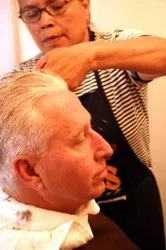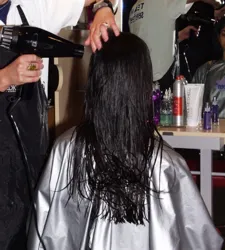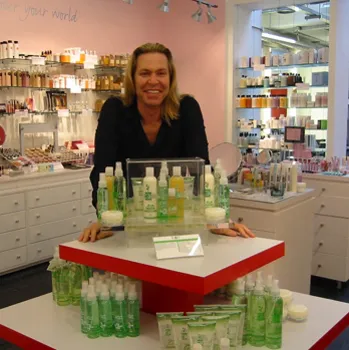
Hairstylists Who Act As Therapists
IntroductionHistorically bartenders have been famous for dispensing advice with mixed drinks. Many people in the salon industry also are expected to dispense advice, a sympathetic ear and comfort along with shampoo, a dab of conditioner and a blow out. Men & Women Spill Their GutsStylists confirm that both men and women will often confide their deepest, darkest secrets while getting trimmed and layered. One stylist told me that she is constantly amazed at the personal secrets some of her clients will tell her. Amazingly a lot of clients will feel very comfortable spilling their guts to a person that they only see every 6 to 8 weeks. While researching this article I talked to many stylists who confirmed that the role of stylist/confessor is a lot more common than people know. According to another stylist, men are just an anxious, if not more so, to share their personal angst and secrets with their stylist. Male customers may have a guilty conscience about some degree of infidelity with their wife or girlfriend and feel more comfortable sharing their secrets with an outsider, like a stylist, that they believe are bound to secrecy. Why Clients Share Their SecretsThe role of stylist as therapist is not new. Although most, if any, beauty colleges don't offer "Counsel While You Style" courses, seasoned professionals understand that many of their clients will feel the need to share their current worries, fears, concerns and frustrations. There are many reasons why clients feel the need to pour out their problems while sitting in the salon chair. Some people are just lonely and want someone to talk to. Others feel it is safer sharing personal information with someone that is not part of their normal circle of friends. They believe that for the most part a stylist will not pass on any information they share. Another reason is the feeling of comfort that many clients naturally feel while having a stylist work on them. Many clients feel an automatic intimacy to their stylists due to the physical closeness of touch. The stylist is required to touch the client's hair, which will often instill relaxation and comfort. The need for advice from neutral outsiders is another reason that stylists, like bartenders, are often asked to wear the therapy hat. Some people feel that outsiders have a more neutral viewpoint. Some Stylists Don't Want To Be TherapistsSome stylists confess that while they like to provide the best service possible, they are uncomfortable playing the part of stand up therapist. One stylist pointed out that you may not be as neutral as the client wants. However, most stylists are not going to risk losing a good customer or a potential tip by giving the client an opposing view. So the stylist may listen and may give a neutral answer that will guarantee a good tip even though privately they are judging the client differently. How do stylists feel about being forced to act as therapist? Although most stylists respect the need to provide professional discretion, another stylist told me that stylists are not legally or morally bound to keep the secrets like a real therapist is. This is one fallacy that many clients don't consider, except maybe celebrities. So if you plan on telling your stylist about your career as a secret bank robber, think again. Stylists can, and are, fair game to be used against you in a court of law. Most Stylists Will Let Their Clients Know If They Don't Want To Act As TherapistWhile many stylists try to be sympathetic and helpful, just as many stylists don't want the added responsibility of offering advice. When this is the case the stylist will try to change the topic, finish the styling session as fast as possible, or tell the client that they are uncomfortable. One stylist explained that she tried to involve acting as a therapist because she has had clients who have crossed the line by calling her at home to discuss personal issues, or not leaving the salon when their services are complete. This stylist explained that "one women stood by the shampoo bowl while I shampooed my next client in order to continue to talk about her ex-husband and his new wife. I had to finally politely ask her to leave so I could give my full attention to my current customer." "Therapists make a lot more money than I do and they are trained to set boundaries with their clients. I just want to style hair". Clients Shouldn't Spill Their Guts If The Stylist Seems UncomfortableAnother stylist that I interviewed suggested that clients should pay attention to how their stylists reacts to personal information. If they seem uncomfortable or change the topic, take that as a polite and professional clue that the stylist doesn't want to discuss personal information. Another stylist advised that clients should ask the stylist if they are OK with discussing non hair related topics. Drawbacks To Salon TherapyWhile some clients may find it refreshing to be able to dump their personal problems on the stylist, they may pay a heavy price for this "free advice" that they would not pay if they exercised their demons at a licensed counselor's office. When a client continuously uses their stylist to alleviate their anxieties the relationship can change from stylist/hair client to a more personal friendship. This can often be disastrous when your personal relationship gets in the way of a great hairstyle or cut. A classic example involves the scenario where you get a bad haircut. It is usually a lot easier for people to tell their stylist when they don't like the results of a new cut than to tell a stylist that they have bonded with. One client that I interviewed, who had formed a strong friendship and bond with her stylist, told me that she regretted how she handled her relationship with her stylist. Laura explained that she met her stylist at her church and then started sharing personal information. One day Laura's stylist convinced her to get a perm. It was a disaster and Laura's hair broke off at the roots in several places. Laura told me that she cried her eyes out for weeks and decided not to go back to the stylist. Laura didn't want to hurt her stylist's feeling by telling her how unhappy she was with the horrible perm. Yet she didn't want to go back. She felt caught in a trap. What Laura did is change churches and stop going to her stylist. Laura said once she saw the stylist at a local grocery store and she hid to avoid the stylist. While Laura may be an extreme example, this could happen if you get too friendly with your stylist. Preventing Drawbacks To Salon TherapyTo prevent possible problems you may want to avoid sharing your secrets with your stylist. If you already have that kind of relationship, you may want to slow it down or focus on non-personal topics. If you have a close personal relationship with your stylist already and you are worried about miscommunication issues over your hair there are some things you can do. 1. Take a photo or photos of the way you want your hair to look to your stylist when you go visit. Focus your conversation on the style and how to care for it after you leave the salon. By focusing on your hair you can avoid problems with the stylist taking liberties with your hair. 2. Don't go to see your stylist with the expectation that they will help to solve your personal problems or make you feel better. Remember that you are going to your stylist to have styling done to your hair and for no other reason. 3. Go to your stylist expecting a beautiful hair style from a professional stylist. Nothing else. 4. While it is probably OK to talk to your stylist about having a bad day at work it is probably better not to reveal that you slept with your boss and how you plan to break up his marrage. Keep your personal conversations light and save deeply rooted problems with your counselor. 5. If you have a problem with your stylist because you have become too close and want to stop going to that stylist, send a brief note. Tell the stylist that you have enjoyed working with them, have decided to try some other options and wish them well. That way you won't have to change churches or hide in grocery stores to avoid running into your stylist. 6. If you do have a personal bond with the stylist, leave the salon promptly when your styling session is over and don't call the stylist at the salon or their salon unless they ask you to do so. |
| If you want to talk more about this or other hair care articles on HairBoutique.com or anywhere else, please post a message on HairBoutique.com's Hair Talk Forums.
|
Social Media Network Information
Please follow us on Twitter at: https://Twitter.com/HairBoutique. I look forward to meeting new people from all walks of Twitter and learning from their Tweets.
















